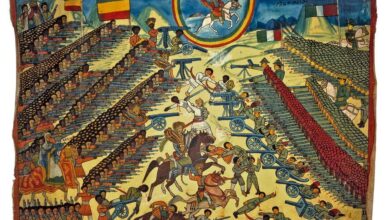Powerful African Warrior Queens in History You Never Knew

It is difficult to explain how women fell from glory, taking a step back at the legendary roles African warrior queens portrayed in history.
Women were pioneers and not simple devotees searching for a voice. Men bowed to them and they directed militaries.
It’s a different story today for women but lets take a look at Great African warrior queens and their heroic acts.
Also Read: Queen of Sheba (Queen Makeda)’ The Exotic & Mysterious Woman of Power
Courageous African Warrior Queens in History
For this rundown, our emphasis isn’t on the women that battled, yet women that ruled.
#1: African Warrior Queens: Queen Amina of Zaria
Queen Amina of Zaria is one of the best African warrior queens to date. She was the little girl of King Nikatau and Queen Bakwa Turunku.
Brought into the world in 1533, Queen Amina was a champion queen of Zazzau — which is the present Zaria City in Nigeria’s Kaduna State.
She was presented to military and political issues by her granddad. In 1576, she succeeded the throne, and Zaria became one of the biggest of the seven Hausa states.
Inside a couple of months of her rising to the lofty position, she left on a progression of military commitment.
She drove a major military band, facing conflicts ceaselessly all through her tenure.
“Amina conquered all towns to the extent of Kwararafa (toward the North) and Nupe (toward the South)”.
She was the cerebrum behind the development of defensive amours among the military in Hausa land.
Likewise, she was partial to taking a sweetheart in each town she went through.
Those sweethearts/lovers didn’t live to tell the story — they were executed the following day subsequent to going through the night with the sovereign.
She is credited for developing the particular and strengthened antiquated city walls known as ganuwar Amina or “Amina Walls” in her area.
Large numbers of these developments are as yet remaining right up to the present day.
#2: African Warrior Queens: Queen Moremi of Ile-Ife
Queen Moremi Ajasoro was brought into the world in Offa, a town in southwestern Nigeria.
She is renowned for her courage and civility that saved the people of Ile-Ife from servitude.
She was married to Oranmiyan, the child of Oduduwa.
In the 12th centuary, people of Ile-Ife were attacked and mistreated by a specific clan known as “people of the forest”.
To save her kin, she vowed to the water spirit called “Esimirin” that she would forfeit anything requested of her if she would find her oppressors’ secret.
Queen Moremi camouflaged and was kidnapped by their oppressors.
She in the long run got married to the head of the group because of her beauty and respect.
Through this position, she found her intruders’ secret, and her kin were liberated.
She got back to her kin and to the waterway spirit to fulfill her vow. Tragically, the water spirit requested Moremi’s only child, Olurogbo.
She kept her commitment and forfeited her only child. This penance disheartened the whole people of Ile-Ife.
Up Until today, people of Ile-Ife see themselves as the “everlasting children” of Queen Moremi.
They additionally commend the Edi celebration out of appreciation for her magnanimous demonstration.
The sculpture of Moremi, known as the “Sovereign Moremi Statue of Liberty,” is the fourth tallest sculpture in Africa and the tallest in Nigeria.
#3: African Warrior Queens: Makeda, Queen of Sheba
Queen Makeda of Sheba was the main African warrior queen and a female Monarch referenced in the Hebrew Bible.
She was a lady of riches and influence. Her most momentous effect was overcoming the snake King Awre.
The snake ruler troubled the Northern Ethiopia Kingdom of Axum around then.
She was eminent for her knowledge and cunning which was supported by her visit to King Solomon’s royal residence in Jerusalem.
She later had a child for King Solomon, whose name was Menelik. Along these lines, Menelik turned into Ethiopia’s most memorable majestic ruler and first imperial ruler.
#4: African Warrior Queens: Queen Nefertiti of Egypt
Queen Neferneferuaten Nefertiti was brought into the world in 1370. The name Nefertiti signifies “the beautiful lady has come”.
She was the imperial spouse of Pharaoh Akhenaten, the eighteenth Dynasty King of Ancient Egypt.
Notwithstanding, she and her better half were renowned for supporting the strict transformation.
She played a functioning job in the worship of Aten — a sun god. Queen Nefertiti supported her better half, he later promoted her from Great Royal wife to co-regent.
Also Read: Black Kings And Black Queens Who Ruled Parts of Europe For Almost 700 Years
#5: Queen Cleopatra of Egypt
Queen Cleopatra VII Theo Philopator was brought into the world in mid 69 BC and was the girl of Ptolemy. The African warrior queen was a result of interbreeding, a typical practice among the Ptolemaic line people.
Queen Cleopatra was not from Egypt but rather was brought into the world in Egypt.
She married her young adult siblings, who filled in as ceremonial spouses during her reign. Additionally, she had relationships with a few individuals for political reasons.
Notably Julius Caesar and Mark Anthony. Queen Cleopatra and Mark Anthony were something other than political lovers, the two were love birds.
Queen Cleopatra killed her sibling when she figured out he was a danger to her position.
She passed on in 30 BC. Today, Queen Cleopatra highlights in a few Egyptian and Roman styles ancient works of art.
#6: Queen Ranavalona of Madagascar
Queen Ranavalona managed Madagascar for a considerable length of time. Queen Ranavalona was a normal everyday citizen adopted into an illustrious/royal family.
Her adoption came as a reward for her father’s fearless demonstration of uncovering the homicide plot against the Merina King, Adianampoinimenia.
In this way, she wedded the King’s child, Radama. Queen Ranavalona was the first out of the twelve spouses of Radama, yet had no kid for him.
She later had an affectionate illicit relationship with another man and gave birth a child named Rakoto.
After the death of her husband, she ascended the throne by killing each possible regent. She was a wild and brutal ruler with a bad reputation.
During her reign, there was no opportunity for Christians. A large number of them needed to escape. Those that couldn’t were mercilessly killed.
Before her rising to the high position, the Europeans approached Madagascar.
Be that as it may, when she succeeded the throne, she changed the general public back to its customary way of life.
She was resistant to the European powers and development. She was brutal towards each contradicting subject to her authority.
One of her normal types of discipline is “tanguin” — a type of discipline wherein guilty parties were given tangena to eat. Tangena is a poisonous nut that makes one vomit.
Notwithstanding her oppressive rule, she held Madagascar back from turning into England and made Madagascar a free state.
Likewise, Queen Ranavalona was a devoted and strategic forerunner throughout the entire existence of Madagascar.
#7: Queen Nandi of Zulu
Queen Nandi was brought into the world in 1760 in Melmoth, South Africa, and she was Shaka Zulu’s mom — one of the Zulu Kings in South Africa.
She was a figure of solidarity to the realm of Zulu. she gave birth out of wedlock, which caused her to experience a lot of insult and embarrassment at other women.
In any case, she was solid and tough and was determined that her son, Shaka, would be one of the greatest kings.
There were times when she was unable to take special care of herself and her child, particularly during the 1802 food deficiency.
Queen Nandi needed to walk a significant distance to look for help to accommodate her child.
Through her determination, Shaka turned into an incredible ruler. Queen Nandi’s relentlessness affected the kingdom.
She taught and imparted extraordinary qualities in her child, and it was obvious in the manner in which Shaka treated his subjects, particularly women.
Despite the fact that she died in 1827, her work lives on.
She might not have been among the African warrior queens but she raise an incredible warrior ruler.
#8: Queen Muhumuza of Rwanda
Queen Muhumuza was married to a Rwandan King, Kigeli IV. She was one of the impressiveAfrican warrior queen with outstanding activism.
After the death of her better half, she opposed Rwandan colonial powers and moved to Uganda.
Likewise, she was a lady of phenomenal person and spiritual powers.
She became the spiritual leader of the Nyabinghi cult which was based on Queen Nyabinghi — another extremely powerful African queen.
Nonetheless, she is generally popular for her political development and social activism.
She battled against the three colonial powers in the locale; the Germans, the British, and the Belgians from the adjoining Congo.
Queen Muhumuza’s grit acquired her the name Rutatiina-Mireego which signifies “one who never fears bows and bolts”.
She passed on in 1945, however her soul lives on through the Rastafarian movement.
#9: Queen Yaa Asantewa of Ashanti
Queen Yaa Asantewa was brought into the world in 1840. She was the Queen mother of Ejisu in Ashanti Empire, presently part of advanced Ghana.
Her most exceptional commitment was in the conflict (battle of the Golden stool) against British imperialism.
The British sent a portion of the Asante Kings to exile and looted their land.
Moreover, the British Governor-General mentioned the “Golden stool” of the Asante people.
The Golden stool was a symbol of the Asante kingdom. This incited Yaa Asantewaa, and she valiantly drove the conflict and battled for her territory.
She was a scholarly legislator and a political dissident.
The African Queen passed on in 1921. In any case, she stays a figure of dauntlessness throughout the entire existence of the Asanti realm.
To respect her, Yaa Asantewa Girls’ Secondary School was established in Kumasi to support more female forerunners in Ghana.
Also Read: Top 10 African Names Girls Children can use Associated with African queens
#10: Kandake, Empress of Ethiopia
“Kandake” signifying “incredible lady,” was utilized as a dynastic name for the Queens of Moreo, the capital of Kush (Ethiopia).
Numerous African warrior queens controlled Ethiopia. Kandake ruled with her spouse.
Women were the sole rulers of Moreo in ancient times. Among them was a Candace that governed in 332 BC.
The Candace of 332 BC was a courageous leader. She set a norm of greatness in the class of African warrior queens.
Her bravery was apparent in the manner she kept Alexander the Great from entering Kush.
Alexander needed to withdraw to Egypt. Another tenable story is that of Kandake Amanirenas of 22 BC.
She was a courageous African warrior queen throughout the entire existence of Ethiopia.
Additionally, she battled against the Roman powers, however, Gaius Petronius crushed her.
Regardless of the loss, her valiance won the Kushites ceasefire with Rome which went on for a long time in 22 BC.
Conclusion
It is difficult to tell how the tide changed to where we are today.
The courageous demonstrations of these African warrior queens will keep on remaining in our souls.





